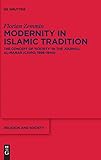Modernity in Islamic Tradition : The Concept of ‘Society’ in the Journal al-Manar (Cairo, 1898–1940) / Florian Zemmin.
Material type: TextSeries: Religion and Society ; 76Publisher: Berlin ; Boston : De Gruyter, [2018]Copyright date: ©2018Description: 1 online resource (XIII, 519 p.)Content type:
TextSeries: Religion and Society ; 76Publisher: Berlin ; Boston : De Gruyter, [2018]Copyright date: ©2018Description: 1 online resource (XIII, 519 p.)Content type: - 9783110543995
- 9783110544862
- 9783110545845
- 290#23sdnb
- MLCM 2021/43754 (B)
- online - DeGruyter
- Issued also in print.
| Item type | Current library | Call number | URL | Status | Notes | Barcode | |
|---|---|---|---|---|---|---|---|
 eBook
eBook
|
Biblioteca "Angelicum" Pont. Univ. S.Tommaso d'Aquino Nuvola online | online - DeGruyter (Browse shelf(Opens below)) | Online access | Not for loan (Accesso limitato) | Accesso per gli utenti autorizzati / Access for authorized users | (dgr)9783110545845 |
Browsing Biblioteca "Angelicum" Pont. Univ. S.Tommaso d'Aquino shelves, Shelving location: Nuvola online Close shelf browser (Hides shelf browser)
Frontmatter -- Acknowledgments -- Contents -- Chapter 1 Introduction: Modernity, Islam, and Society – The Argument for a Heuristic Eurocentrism -- Part A. Assumptions: ‘Society’ and the Secular in European Modernity -- Chapter 2. ‘Society’ in European Modernity -- Chapter 3. A Secular Age as a Heuristic Tool -- Part B. Expectations: Egyptian Modernity, al-Manar, and Arabic Concepts -- Chapter 4. Modernity in Egypt: Nation, Society, Secularism, and the Press -- Chapter 5. Al-Manar: The Mouthpiece of Islamic Reformism -- Chapter 6. The Arabic Saddle Period and Arabic Terms for ‘Society’ -- Part C. Findings: ‘Society’ in al-Manar -- Chapter 7. Al-Hayʾa al-Ijtimāʿiyya in al-Manar: Offering Umma as an Alternative -- Chapter 8. Mujtamaʿ in al-Manar: Avoiding the Established Meaning of ‘Society’ -- Chapter 9. Rafiq al-ʿAzm: Islamic Reformist, Secular Historian, and Sociological Thinker -- Chapter 10. Social Association Reified: Ijtimāʿ, Ijtimāʿī, and Umma in Articles by Rashid Rida -- Chapter 11. Conclusion: Society, The Immanent Frame, and Modernity – Concepts, Spins, and Genealogies -- Bibliography -- Appendix: Tables of Search Terms -- Index
restricted access online access with authorization star
http://purl.org/coar/access_right/c_16ec
What does it mean to be modern? This study regards the concept of ‘society’ as foundational to modern self-understanding. Identifying Arabic conceptualizations of society in the journal al-Manar, the mouthpiece of Islamic reformism, the author shows how modernity was articulated from within an Islamic discursive tradition. The fact that the classical term umma was a principal term used to conceptualize modern society suggests the convergence of discursive traditions in modernity, rather than a mere diffusion of European concepts.
Issued also in print.
Mode of access: Internet via World Wide Web.
In English.
Description based on online resource; title from PDF title page (publisher's Web site, viewed 28. Feb 2023)









